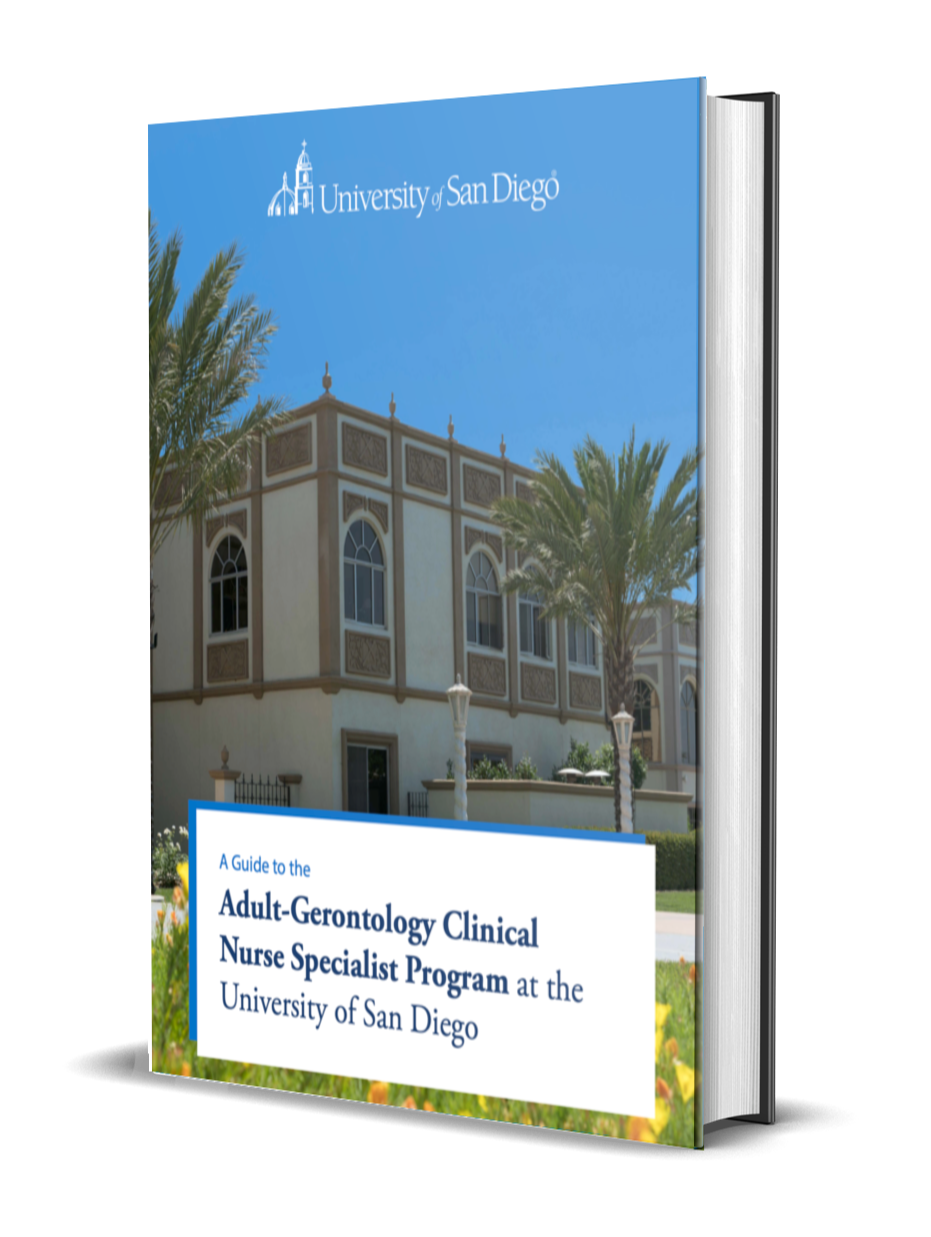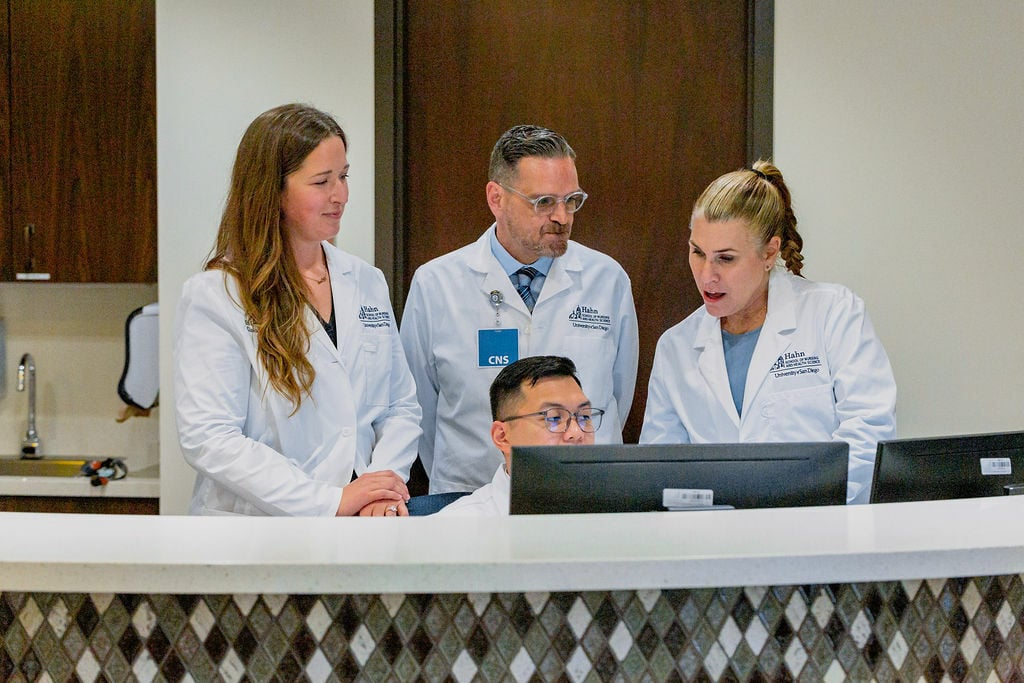
Discover the Benefits of a Nursing Degree From USD
The information in this blog post is for informational purposes only and is not intended to replace medical, financial, or professional advice.
In the nursing profession, pain and joy are intimately intertwined. Some nurses participate in medical miracles in one room, while just a few doors down, others advocate for patients as they take their final breaths.
The reality is, this cosmic intermingling is a lot for the human mind and heart to handle. The weight of trauma can only be stacked so high on the shoulders of the individuals that bear it before they go numb.
This numbness and feeling of indifference in the face of trauma is known as compassion fatigue. The frontline role of nursing regularly exposures those in the field to trauma, therefore putting nurses at high risk for developing compassion fatigue.
Defining compassion fatigue in nursing
Compassion fatigue is defined as a state of reduced capacity for compassion onset by repeated exposure to the trauma or suffering of others. In other words, others’ trauma can be experienced as one’s own trauma. Nurses are regularly exposed to traumatic experiences in the people they serve, making them even more susceptible to developing compassion fatigue.
Compassion fatigue has been studied in several fields of nursing, but nurses working in some disciplines (such as acute, critical and intensive care, pediatrics, psychiatry, and in the care of older people) have exhibited heightened levels of compassion fatigue.
It is imperative that nurses are aware of the signs of compassion fatigue and how to respond when they are displaying symptoms. And for those in leadership, it's important to be proactive, understanding how to prevent compassion fatigue in the first place.
On the frontlines: COVID compassion fatigue
The COVID-19 pandemic took its toll on the healthcare system, along with the mental health of the professionals that comprise it. From inadequate facilities, short staffing, and lack of personal protection equipment, health professionals were thrown innumerable challenges over the past two and a half years. According to a recent study, levels of compassion fatigue went from medium to high among health professionals during the COVID-19 pandemic.

The same study demonstrated nurses are at higher levels of risk for developing compassion fatigue compared to other health professionals. Now more than ever, it is important for nurses to educate themselves on the signs of compassion fatigue to protect themselves from further trauma and heal from that which they have already experienced.
What are the signs of compassion fatigue?
Compassion fatigue is the individual’s response to trauma that shifts their worldview. The initial onset can be slow but increase over time, making it difficult to spot. Compassion fatigue can manifest in both mental and physical signs.
Many of the signs of compassion fatigue are associated with symptoms similar to that of anxiety or depression, including fear, detachment, numbness, or an inability to focus.
Below is a list of some of the telltale mental and physical signs of compassion fatigue:
Mental signs of compassion fatigue
- Feelings of detachment
- Increased signs of anxiety and depression
- Difficulty concentrating, making decisions, or being productive
- Reduced feelings of empathy
- Feeling overwhelmed, helpless, or in the face of patients’ suffering
- Irritability
- Anger
- Compromised patient care
- Avoidance of patients
- Increased substance abuse
- Low self-esteem
- Diminished sense of personal accomplishment
Physical signs of compassion fatigue:
- Exhaustion or extreme fatigue
- Aches and pains
- Gastrointestinal pain
- Difficulty sleeping
- Impaired Immune system
Compassion fatigue self-assessment
If you identify with a number of the symptoms listed above, you can take the following compassion fatigue self-assessment. Answer ‘yes’ or ‘no’ to the following questions:
- Personal concerns commonly intrude on my thoughts and affect my professional role.
- My colleagues seem to lack understanding or empathy.
- I find even small changes very taxing.
- I struggle to recover after association with trauma.
- Association with trauma deeply influences me.
- My patients' stress profoundly affects me.
- I often feel hopeless.
- I often feel vulnerable.
If you answered ‘yes’ to four or more statements, you may be suffering from compassion fatigue. Thankfully, there are several compassion fatigue treatment methods to help those in nursing heal from its ramifications.
Compassion fatigue treatment: steps to jumpstart the healing process
The road to healing from compassion fatigue may take time, but it is ultimately filled with hope because you are not alone. The healing journey may begin with small strides, but little steps in consistency can restore your enjoyment of life and the nursing profession again. Let’s look at five ways to treat compassion fatigue:
- Begin with the basics: diet, exercise, and mindfulness
A crucial first step to healing from compassion fatigue is ensuring you are eating a healthy, well-balanced diet and prioritizing exercise in your daily life. Maintaining this kind of routine can be difficult, especially when the weight of your profession has been bleeding into your personal life. Mindfulness activities such as meditation are also a great way to retrain your thoughts to keep them focused on the present moment. - Take time away from work
Distancing yourself from work can allow you the space to recalibrate and gain a fresh perspective. Even if it is for just a day or two, having physical separation from your job can give you the space to designate healthy boundaries moving forward. - Find your people
When suffering compassion fatigue, it is a natural response to isolate yourself. However, it is imperative to surround yourself with people that support you and whom you feel you can confide in: trusted loved ones, friends, or colleagues. There is also a significant benefit in finding a support group of other nursing professionals that have shared experiences with you. - Indulge in a hobby outside of work
Finding a hobby outside of nursing can stretch those creative parts of your brain and help you garner new passions. Hobbies allow for newfound outlets of joy that help alleviate stress. Activities such as pottery, piano lessons, or hiking can bring a fresh sense of purpose and enjoyment to your life. - Seek professional help
Compassion fatigue is a form of trauma and oftentimes requires professional treatment. Seeking help for your mental health is a sign of strength and will only make you a stronger and more effective nurse. Treatment from a counselor or therapist can equip you with the coping skills needed to heal and help restore your love of nursing.
You can find meaning in nursing again, either at the bedside or beyond
Compassion fatigue in nurses is a very real condition that affects healthcare professionals worldwide. If the weight of bedside nursing is becoming too much to bear, there are ample non-bedside nursing roles you can pursue that make a difference. Nursing, in all its forms, is a compassionate and impactful career that directly benefits the patients it serves.
At the University of San Diego School of Nursing, we offer several advanced degrees in the nursing discipline that will empower you to make a difference and become a nurse leader in service to the community—whether you are at the bedside or not.
Request more information or explore all the options USD School of Nursing has to offer—no matter the path toward compassionate care you wish to take in our guide on compassion fatigue.
The information provided by USD’s Hahn School of Nursing and Health Science is for informational purposes only and is not intended to replace professional medical or financial advice. This includes, but is not limited to, blog posts, eBooks, webinars, emails, graphics, social media posts, and other content. Always seek the guidance of your physician or a qualified medical or financial professional.
A Guide to the University of San Diego's Adult-Gerontology Clinical Nurse Specialist Program
The University of San Diego's nursing program ranks among the best in the nation. But that's not the only reason future students walk through our doors to pursue one of our graduate degrees. Download our guide for an in-depth look at the Adult-Gerontology Clinical Nurse Specialist program and learn how our rich heritage of excellence in nursing education can help you achieve your academic and professional goals.
GET THE GUIDE









-1.jpeg)